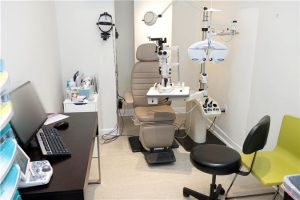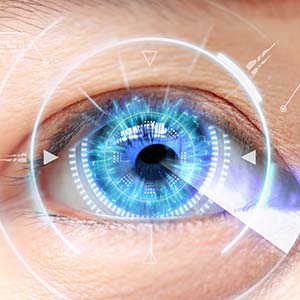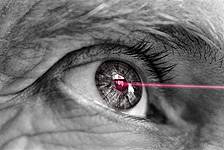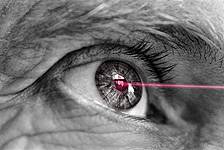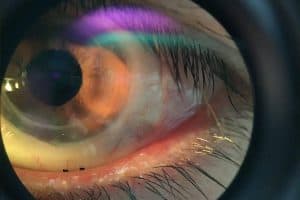Contact Lenses and Children: Part 2 Q&A
Did you know? Contact lenses can be safely worn by children aged 8 and up. Many times, parents are hesitant to get their child contact
Read MoreContact Lenses Safety for Children
Eye doctors report that over 4 in 10 of their contact lens patients are school aged children. According to the American Optometric Association (AOA), 14.5
Read MoreTop 8 Tips for Allergies and Contact Lenses
Do you suffer from allergies, but also want to wear contact lenses? Pollen is not the only cause of allergies that can affect your eyes
Read MoreEyes and Herpes: Q&A
Herpes eye infection requires urgent medical attention. Eye herpes, also known as herpes keratitis, is a viral infection of the eye caused by the herpes
Read MoreHow Does Herpes Affect the Eyes?
Eye herpes affects over 1.5 million people around the world each year. The most common type of eye herpes is called epithelial keratitis, which tends
Read MoreContact Lenses: Daily or Monthly?
An estimated 45 million people in the U.S. wear contact lenses. Contact lenses are a great choice for people who want convenience and clear vision.
Read MoreIs Sleeping in Contact Lenses Dangerous?
About one-third of contact lens wearers occasionally sleep with their lenses. It’s easy to fall asleep in your contact lenses; one minute you’re reading a
Read MoreWhen is Blurred Vision a Medical Emergency?
A problem with any part of the eye, such as the retina, optic nerve or cornea, can suddenly cause blurred vision. Slowly progressive blurred vision is usually caused by long-term medical conditions. Sudden blurring is most often caused by a single event. Some instances of sudden blurred vision are medical emergencies that must be treated as soon as possible to prevent permanent damage and vision loss.
Read MoreDry Eye or Eye Infection?
Are your eyes red and irritated? Is it dry eyes or an eye infection? To help you out, here are the key differences between dry
Read MoreNearsighted or Farsighted?
Have you been told you are ‘nearsighted’ or ‘farsighted’ but not totally sure what they mean? Both of these may require you to rely on
Read MoreGlaucoma: What are the Signs?
Did you know about 3 million people in the U.S. are affected by glaucoma, but only half are aware they have it? Over 90% of
Read MoreGlaucoma: ‘The Silent Thief of Sight’
Did you know that rock star Bono from U2 has glaucoma? U2’s Bono is not alone, at least 3 million North Americans have glaucoma, but only 50% know they have it! In 95% of glaucoma cases, it starts off asymptomatic and by the time the condition is noticed, the vision loss is irreversible. That’s why regular eye exams are so crucial, even if you don’t suspect a problem.
Read MoreCataracts: Top 5 Myths and Facts
Have you been told you have cataracts, but not sure about the myths and facts? Here are the top 5 myths and facts about cataracts.
Read MoreTop 10 Tips For Contact Lens Wearers
If you wear contact lenses, you’ll want to read our list of the top 10 healthy habits that all contact lens wearers should follow. Do
Read MoreCan Sleep Apnea Affect Your Eyes?
Sleep apnea can affect not only your physical health, but can have serious consequences for your eyes and vision too. If you have sleep apnea,
Read MoreWhy Are Eye Exams Important?
Are Eye Exams Important? Yes! Many eye conditions, in their early stages, have no obvious signs or symptoms, so the annual exam is often the only way to detect eye conditions early. Since there are often no signs or symptoms, regular comprehensive eye exams are key to maintaining good vision and healthy eyes.
Read MoreWhich Foods Help Dry Eyes?
Over 50% of all adults experience dry eyes. Other than dryness of the eye, symptoms of dry eye include burning, irritation and grittiness. While studies
Read MoreICL Surgery: What to Expect
Over 1 million ICLs have been implanted globally. An implantable collamer lens (ICL) is an artificial lens that’s permanently implanted in the eye, this surgical
Read MoreLASIK Eye Surgery: 5 Myths and Facts
Here’s the most common myths and facts on laser eye surgery. While LASIK eye surgery has become the most popular refractive surgery in the U.S, there are many misconceptions regarding this procedure that prevent people from even discussing LASIK with their eye doctors.
Read MoreScleral Lenses After Laser Surgery
Have you had laser eye surgery and are now experiencing post-surgery complications? If you have had laser eye surgery but still have blurry vision, scleral
Read MoreContact Lenses for Astigmatism
Approximately 1 in 3 people have astigmatism, a vision condition that causes blurry and distorted vision. If you have astigmatism, there is a wide variety
Read MoreTypes of Eye Allergies
Up to 25 percent of people worldwide suffer from eye allergies. If you suffer from eye allergies, you may be wondering what is causing your
Read MoreContact Lenses or Laser Eye Surgery?
Tired of wearing your glasses everyday? If you wear corrective lenses for nearsightedness, farsightedness or astigmatism, you may be wondering about the advantages that contact lenses and laser eye surgery have to offer. Contact lenses are a great solution if you would like to be free of your glasses, but laser eye surgery, also called laser refractive surgery, can help to eliminate the need for corrective eye wear altogether.
Read MoreBurning Eyes at Night
If your eyes are burning at night, you may be suffering from dry eye syndrome. Dry eye syndrome can put a damper on your day
Read MoreWhy Am I Seeing Halos?
Seeing halos around lights can be a cause for concern, or it can be completely normal. If you notice a sudden appearance of halos or
Read MorePink Eye or Allergies?
Do you find that you sometimes struggle to open your eyes due to severe eye discomfort? Eye allergy symptoms can sometimes mimic an eye infection,
Read MoreAre Ortho-K Lenses Safe?
Ortho-k lenses are designed to reshape your cornea while you sleep, so you can benefit from clear vision during the day— without the need for glasses or contact lenses. These specialized lenses are prescribed to control the rate of myopia progression in children, as well as for vision correction without the need for daytime eyewear. The question is, are they safe?
Read MoreWhy Do Adults Choose Ortho-K?
If you have been thinking about ways to improve your vision without the need for corrective eyewear, ortho-k may be the solution you have been searching for
Read MoreEye Protection at Home
90% of eye injuries can be prevented with appropriate eye protection. Many people perform their daily chores without even thinking about the risk of an eye injury. Considering 50% of all eye injuries occur at home, you may want to think about increasing your eye protection around the house.
Read MoreEye Injuries: Are All Toys Safe for Children?
An estimated 11,000 toy-related eye injuries occur in the United States, each year. When purchasing toys for your children keep in mind that many toys
Read MoreCorneal Transplant (Keratoplasty)
More than 44,000 corneal transplants are performed in the United States each year. The cornea is the outermost layer of the eye that is responsible
Read MoreEye Emergency: Hand Sanitizer in Your Eye
One of the best ways to protect yourself from catching a virus is to frequently disinfect your hands. Washing your hands with warm water and
Read MoreWhat Is a Corneal Abrasion?
Corneal abrasions account for over 2 in every 100 eye injuries each year. What is the cornea? The cornea is the clear, outermost layer of
Read MoreKeratoconus Treatment: Corneal Cross-linking
Keratoconus is a progressive eye disease that weakens the cornea and changes its structure — leading to vision problems and even vision loss. The cornea
Read MoreGuide to Scleral Lenses
Scleral lenses are a type of gas permeable (GP) lens that are specially designed for patients with corneal irregularities and other eye conditions that make contact lens wear difficult.
Read MoreThe Contact Lens Exam
Over 22 percent of people who wear eyeglasses enjoy the benefits of also using contact lenses. If you are thinking about contact lenses, a contact
Read MoreKeratoconus
What is keratoconus? Keratoconus is a progressive disease that causes thinning and reshaping of the cornea, the front part of your eye. In a healthy
Read MoreCorneal Dystrophies
Corneal conditions can permantly impact your vision. The cornea is the clear, protective outer layer of the eye. It’s primary function is to act as
Read MoreWhat is Low Vision?
Do you or a loved one have low vision? Low vision is diagnosed when vision cannot be fully corrected with glasses, contact lenses, or eye surgery— allowing you to participate in every day activities. It is often accompanied by blurred vision, blind spots or tunnel vision— and may also be called legal blindness. Low vision may prevent you from driving, watching TV, reading, using a computer or participating in your favorite hobbies.
Read MorePinguecula and Pterygium
Pingueculae and pterygia are benign growths that appear on the eye’s conjunctiva, the clear covering over the white part of your eye. What is a
Read MoreWhat Are Cataracts?
A cataract is the clouding of the eye’s focusing lens, causing blurry vision and vision loss. This condition is painless and usually develops gradually over time. It is the most common cause of vision loss in people over the age of 45.
Read MoreWhat Is Farsightedness?
It is estimated that 13% of school age children are far-sighted, farsightedness, also known as long-sightedness or hyperopia, causes near objects or images to appear blurry. Hyperopia causes the eye to focus what you are looking at behind the retina, instead of on the retina- causing words on a page, or images on your phone to appear out of focus.
Read MoreWhat Is Astigmatism?
Astigmatism is one of the most misunderstood optical terms…maybe because it is so hard to say?! Astigmatism is a refractive error that causes distorted vision, usually at all distances. It is a common vision condition that can be present at birth, or develop over time, and most frequently occurs together with myopia (nearsightedness) or hyperopia (farsightedness).
Read MoreThe 4 Frequent Eye Conditions
Have you been told you have an eye disease or need eye surgery? This guide will help you understand the 4 most common eye conditions:
Read More












